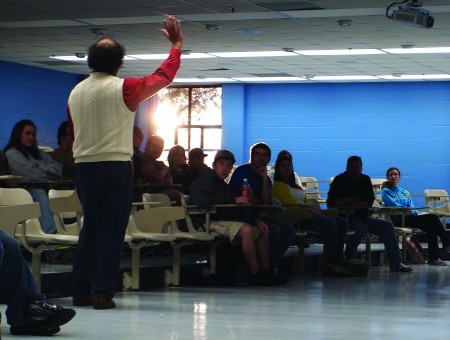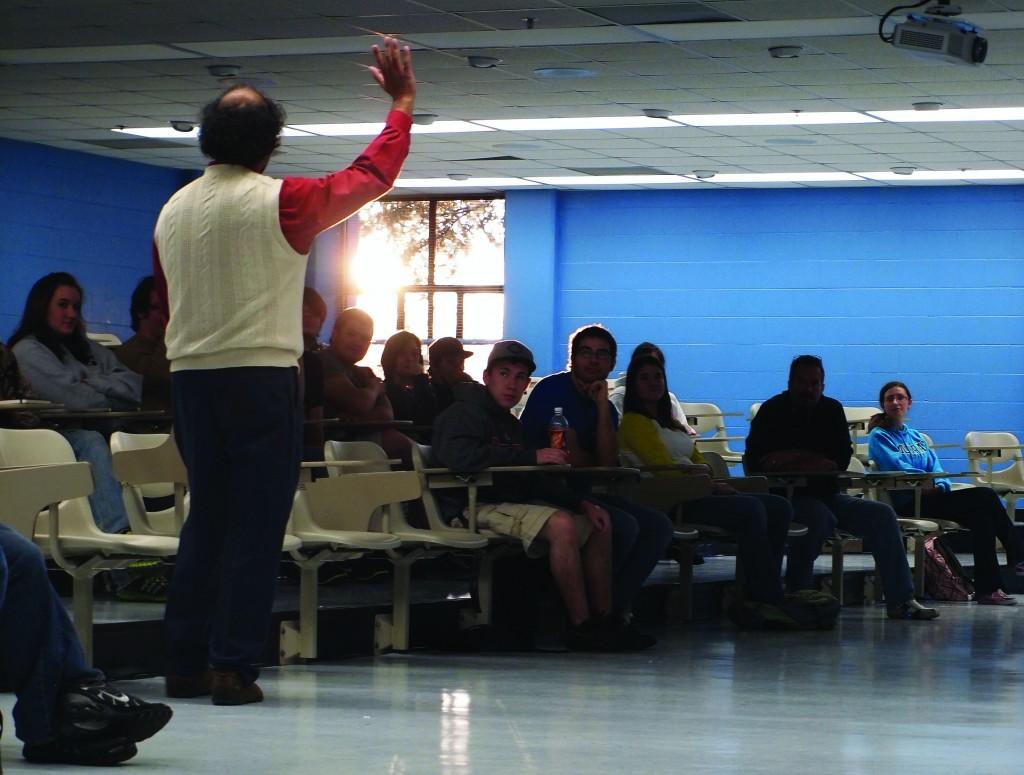
To help combat confusion and explain the nature of the Islamic faith, several professors held a panel discussion on Tuesday, during International Week, to help bring about discussion on the topic.
Brian Clardy, assistant professor and coordinator of Religious Studies, led the panel, along with the aid of Taufiq Rashid, senior lecturer and Zachery Heern, professor. Each of the panelists work within the College of Humanities and Fine Arts.
Clardy began the panel by stating the overall objectives, which included a brief history on the religion of Islam.
“Islam is definitely a religion of tolerance, peace and goodwill,” he said. “It is a religion that not only has spanned centuries but has, to date, 1.6 billion followers all over. It follows the basic Abrahamic traditions and sticks to its own written word with the Quran.”
Clardy raised numerous questions at the event to help set the tone of discussion. He asked where the religion going, has the golden age of Islam happened and how could Mohamed Gandhi’s biography, a film cause a global impact?
The panel was created to promote serious, intellectual dialogues throughout the University, he said. Clardy said diversity is among one of the greatest assets Murray State possesses.
He said he hopes students will take from the panel a new perspective. He said students need to debunk the stereotypes and that he believed it was important to stop seeing foreign as different.
Heern’s discussion focused on the history of the religion and the important advancements made by Islam, developments that contribute to the western world. He said when people look at Islam through a historical lens they see so many great contributions that are overlooked, and that the Islamic countries have been the middlemen of trade.
Heern said some of the most basic humanistic knowledge is based on the translations of Islamic works. He believes that the religion is in its golden age and one great thing about Muslim culture is the followers have no history of racial divisions like the Western Civilization has.
Heern said one of the biggest problems that Islam faces is nationalism, because a large number of the countries were settled by European powers. On the other hand, though, Horn said something that is not greatly realized is most Muslims do accept modern technology.
“For example, Al Qaeda is very adept in using the Internet,” he said. “Although most reject enlightenment principals, modern technology is something they, as a majority, are very open to grasping, even if it may be for warfare.”
The two terrorist groups, the Taliban and Al Qaeda, were a theme at the panel as Heern said they are among the more intense of Islamic sectors.
He said the easiest way to explain was to say those two groups do not only target Western civilizations, but they target anyone who does not fit within their standards.
“This is the reason why there are actually more attacks within the Muslim world itself than is realized,” Heern said.
Rashid wrapped up the discussion by asking the audience what makes a religion successful.
He listed three things as making a religion successful: adaptability, change with time and geographical converts. The three most popular religions in the world – Buddhism, Christianity and Islam – are examples.
“What makes them so successful is their ability to adapt and change,” Rashid said. “The harder the conversion process, the less number of people.”
He said what makes Islam different from other religions is it maintains its identity with both belief and practice, but the standards of practice may change according to location. He said being a Muslim in Baghdad is different then being a Muslim in Calcutta.
Said Rashid: “They are the same at the core but they have different practices.”
Story by Sam Villanueva, Staff writer.





























































































Angelina Guyton • Nov 16, 2012 at 5:33 am
At Dr. Brian Clardy, has Islam religion seen it's golden age – come and gone, in your opinoin?
Brian Clardy • Nov 16, 2012 at 5:34 am
Only if we keep "Othering" the whole community and keep clinging to awful stereotypes……….and only if the extremists (that we see in all faiths) get the bullhorn.